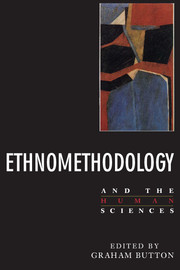Book contents
- Frontmatter
- Contents
- Contributors
- Preface
- 1 Introduction: ethnomethodology and the foundational respecification of the human sciences
- 2 Respecification: evidence for locally produced, naturally accountable phenomena of order, logic, reason, meaning, method, etc. in and as of the essential haecceity of immortal ordinary society (I) – an announcement of studies
- 3 Logic: ethnomethodology and the logic of language
- 4 Epistemology: professional scepticism
- 5 Method: measurement – ordinary and scientific measurement as ethnomethodological phenomena
- 6 Method: evidence and inference – evidence and inference for ethnomethodology
- 7 The social actor: social action in real time
- 8 Cognition: cognition in an ethnomethodological mode
- 9 Language and culture: the linguistic analysis of culture
- 10 Values and moral judgement: communicative praxis as moral order
- References
- Index
7 - The social actor: social action in real time
Published online by Cambridge University Press: 05 June 2012
- Frontmatter
- Contents
- Contributors
- Preface
- 1 Introduction: ethnomethodology and the foundational respecification of the human sciences
- 2 Respecification: evidence for locally produced, naturally accountable phenomena of order, logic, reason, meaning, method, etc. in and as of the essential haecceity of immortal ordinary society (I) – an announcement of studies
- 3 Logic: ethnomethodology and the logic of language
- 4 Epistemology: professional scepticism
- 5 Method: measurement – ordinary and scientific measurement as ethnomethodological phenomena
- 6 Method: evidence and inference – evidence and inference for ethnomethodology
- 7 The social actor: social action in real time
- 8 Cognition: cognition in an ethnomethodological mode
- 9 Language and culture: the linguistic analysis of culture
- 10 Values and moral judgement: communicative praxis as moral order
- References
- Index
Summary
Introduction
If social theory is going to pay any attention at all to the nature of ‘the social actor’, then how is that actor to be conceived? For some approaches to social theory (the structuralism of Althusser, 1971, 1976 and 1979, and Lévi-Strauss, 1963 are notable examples) there is little if any need for such a conception. The human sciences, for them, are not concerned with ‘individuals’ but with social wholes, and insofar as any conception of the social actor is needed then its development will be low priority, and the needs of its theorising can perhaps as well be served by leaving any conception of the social actor largely implicit. Other approaches to sociological theory think that a conception of the social actor is their necessary and fundamental basis, that they must found their understanding of society in ‘the actor's point of view’. These two broad orientations have a long-standing, even traditional, opposition, though they have relatively recently been joined by another position (Derrida, 1976 and 1978; Foucault, 1972; and Lyotard, 1979, being significant examples) which calls a plague on both their houses, telling us that both ‘the subject’ and ‘the social totality’ are mere fictions, by-products of the play of discourse and text.
Though the concern with social wholes regards the issues of the social actor as low priority, its very attempt to justify this evaluation contributes to direct controversy about the nature of the social actor, for making the case on behalf of locating sociological analysis primarily at the level of the totality involves arguing against the idea that social actors could possibly be self-determined.
- Type
- Chapter
- Information
- Ethnomethodology and the Human Sciences , pp. 137 - 175Publisher: Cambridge University PressPrint publication year: 1991
- 51
- Cited by

